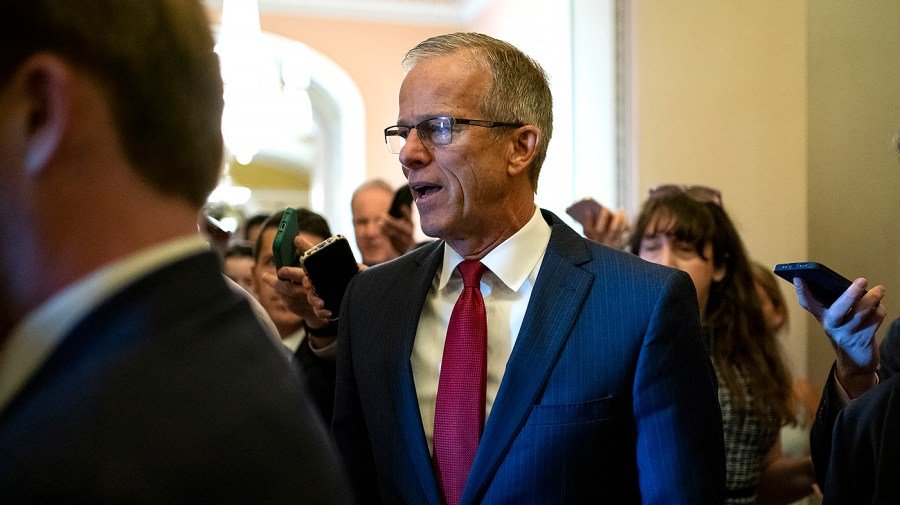
Senate Majority Leader John Thune (R-S.D.) is looking for a reset and to build momentum on President Trump’s big, beautiful bill after it struggled through a tough week on Capitol Hill.
Trump’s July 4 deadline for signing the bill is slipping away as GOP senators battle each other over spending cuts and other issues in the House-passed bill. But Thune wants to get the legislation back on track by convening small working groups to hash out key components of the bill, according to Republicans familiar with his plan.
Thune is hoping to build enough momentum in the Senate’s various committees that the components of the bill come together in a grand compromise by the end of the month.
But rank-and-file senators who have some of the strongest objections to the legislation have yet to see key pieces of text. And Elon Musk’s scathing criticism of the bill as a “mountain of disgusting pork” is creating political headwinds for the legislation.
A GOP senator familiar with Thune’s strategy says he will break out portions of the bill to Senate Republican working groups in an effort to make progress on the sections that face the strongest objections — such as nearly $800 billion in spending reductions for Medicaid and $267 billion in cuts to the Supplemental Nutrition Assistance Program (SNAP).
“Thune’s going to do the same thing he did for other things where folks have deeper issues. He’ll put small groups together. No one is going to be able to say they weren’t listened to,” the GOP senator said.
Thune’s plan to involve a broader swath of his caucus in negotiations on a must-pass bill is a departure from former Senate Majority Leader Mitch McConnell (R-Ky.), who tended to keep the details of major deals close to the vest until shortly before he unveiled them, the senator said.
Senate Republicans control 53 seats and can afford only three defections and still pass the bill. No Democrat is expected to support it, and it is not subject to a filibuster.
Senate Finance Committee Chair Mike Crapo (R-Idaho) told GOP colleagues at a meeting last week the bill already faces two likely Republican “no” votes.
Thune told The Hill that he wants to inject fresh momentum into the bill next week and move at “full speed” toward Trump’s July 4 deadline, even though he told GOP colleagues privately earlier this year that getting the legislation to Trump’s desk by the August recess is a more realistic target.
“We’re continuing to have meetings with groups and committees,” he said. “Full speed ahead, a lot of conversations, getting everybody comfortable.”
The biggest obstacle the bill faces is that many Republican senators are demanding more deficit reduction but a group of lawmakers, including Sens. Susan Collins (R-Maine), Lisa Murkowski (R-Alaska), Josh Hawley (R-Mo.) and Jerry Moran (R-Kan.), are objecting to the biggest deficit-reduction in the bill currently: Hundreds of billions of dollars in Medicaid spending cuts.
This has Republican senators looking for new strategies to further reduce the deficit without cutting more deeply into Medicaid or SNAP.
The latest proposal that has interest from several members of the Senate Finance Committee, including Sens. Bill Cassidy (R-La.), Roger Marshall (R-Kan.) and Thom Tillis (R-N.C.), is a proposal to root out “waste, fraud and abuse” in the Medicare Advantage program.
Cassidy has a bipartisan proposal cosponsored by Sen. Jeff Merkley (D-Ore.) to crack down on “upcoding,” a practice whereby insurance companies bill Medicare for additional diagnoses that may not be medically necessary or urgent. The proposal could raise as much as $275 billion over 10 years.
Marshall said he’s getting “a huge number of complaints about Medicare Advantage from our seniors,” a big increase in dissatisfaction compared to just four years ago.
“Now many, many seniors call and say they feel like they’ve been taken [advantage of.] They can’t see the doctor they want to, no one told them that. They can’t go to the hospital [around] town. There’s been a lot of fly-by-night Medicare Advantage programs coming in to take care of people. I think it’s a huge problem,” Marshall said.
Medicare Advantage plans have a financial incentive to make beneficiaries appear sicker than they might be because they are paid based on the health of an individual patient.
Some Republicans, however, are pushing back hard on the idea of turning to Medicare for spending cuts, even if they are intended to address what proponents call “waste, fraud and abuse.”
“I hear talk about Medicare, which I think is insane,” Hawley said. “I don’t like the idea of that at all.”
Sen. Ted Cruz (R-Texas), meanwhile, is floating a proposal for the Federal Reserve to stop paying interest on bank reserves, a practice that Congress implemented during the 2008 financial crisis to stabilize the banking sector.
“For most of the history of the Federal Reserve, they did not pay interest on reserves held by banks. And then in 2008 Congress changed the law and they spend roughly spend roughly $100 billion a year. And so eliminating that would save a trillion dollars over 10 years,” he said.
Cruz said the idea is “certainly under discussion” as part of the search for new proposals to improve the big, beautiful bill’s budget score.
Senate Republican leaders say the House-passed bill would reduce spending by $1.6 trillion over the next decade but a group of Republican senators want to get that number closer to $2 trillion.
Thune has met in small groups with GOP colleagues to discuss their concerns with Medicaid reforms and lawmakers say they’re happy with the level of engagement so far.
Moran, who warned on the floor earlier this year, that he could not support Medicaid changes that imperil the fiscal health of rural hospitals, said he doesn’t think the bill will need to be marked up as long as he continues to have solid input with the negotiators.
“I don’t expect the bill to be the House bill. And we’ll work to put our priorities in front of the Finance and Budget Committees to see what kind of success” we can have in making changes, Moran said. “There’s lots of places I have issues.”
He said he has concerns about reforms to health care provider taxes, which states have used to draw more federal Medicaid funding.
Republicans are uncomfortable with the latest Congressional Budget Office estimate that changes to Medicaid and subsidies under the Affordable Care Act could cause an estimated 10.9 million Americans to lose health care coverage.
Collins, Murkowski and Moran have also raised concerns about cuts to SNAP and the effort to shift more of the administrative costs of the programs onto states.
Murkowski, Moran, Sen. Thom Tillis, Sen. John Curtis (R-Utah) and Sen. Shelley Moore Capito (R-W.Va.), meanwhile, are raising objections to the quick phaseout of renewable energy tax breaks in the House bill.
Capito is concerned about House language that would phase out federal tax support for the Appalachian Regional Clean Hydrogen Hub in West Virginia if construction doesn’t get underway by the end of this year.
“You have to be under construction by 2025, the end of this year. Our hydrogen hub cannot be under construction by that time. So it’s problematic for us. It’ll be a lot of jobs and a lot of energy-for-the-future types of opportunities for our state. I’m trying to work with other folks who have difficulties with this,” Capito said.
Republican senators say the House-passed bill can’t get a majority vote in the Senate without significant changes and predict it will take a lot of negotiating before it comes to the floor.
“It’s a work in progress,” said Sen. John Cornyn (R-Texas), an adviser to the Senate GOP leadership team. “We don’t have as thin a margin as the House, but we got to get to 51.”

